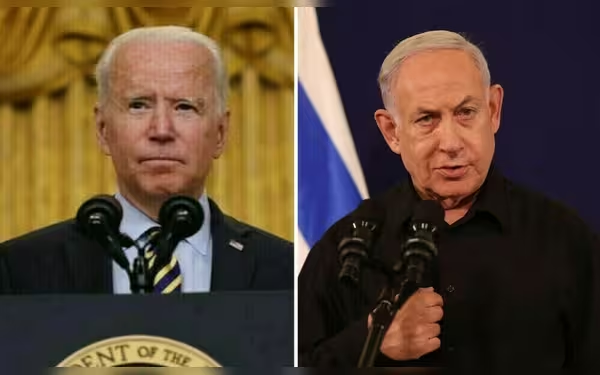Saturday, November 16, 2024 07:51 PM
Biden And Netanyahu Discuss Escalating Tensions In Middle East
- Biden and Netanyahu's first call since August.
- Iran's missile attack raises regional conflict concerns.
- Strained US-Israel relations over Gaza war handling.
 Image Credits: brecorder
Image Credits: brecorderBiden and Netanyahu discuss rising tensions in the Middle East amid Iran's missile threats and ongoing Gaza conflict.
In a significant development, US President Joe Biden and Israeli Prime Minister Benjamin Netanyahu engaged in a crucial conversation on Wednesday. This call comes at a time of heightened tensions in the Middle East, particularly concerning Iran. The dialogue marks the first interaction between the two leaders since August, coinciding with an escalation in Israel's conflicts with Iran and the Iran-backed Lebanese Hezbollah. The situation remains precarious, with no immediate signs of a ceasefire in the ongoing conflict involving Hamas in Gaza.
The backdrop of this conversation is a recent missile attack by Iran, which was perceived as a retaliation for Israel's military actions in Lebanon. Although the Iranian attack did not result in any casualties in Israel, it was deemed ineffective by Washington. Israeli Defence Minister Yoav Gallant characterized the missile strike as a failure and warned that any future attacks on Israel would be met with a “lethal, precise and surprising” response. He emphasized, “Whoever attacks us will be hurt and will pay a price.”
Netanyahu has made it clear that Iran will face consequences for its missile attack, while Tehran has threatened that any retaliation would lead to widespread destruction. This exchange of threats raises concerns about the potential for a broader conflict in the oil-rich region, which could involve the United States.
The relationship between Biden and Netanyahu has been strained, particularly due to differing views on the handling of the war in Gaza and the conflict with Hezbollah. In an upcoming book titled “War,” journalist Bob Woodward reveals that Biden has openly criticized Netanyahu's approach, reportedly expressing frustration by saying, “Bibi, what the fuck?” during a heated discussion in July regarding Israeli strikes in the region.
As the situation unfolds, it is essential to recognize the complexities of international relations in the Middle East. The ongoing tensions not only affect the countries involved but also have broader implications for global stability. The world watches closely as both leaders navigate this challenging landscape, hoping for a resolution that prioritizes peace and security for all parties involved.













